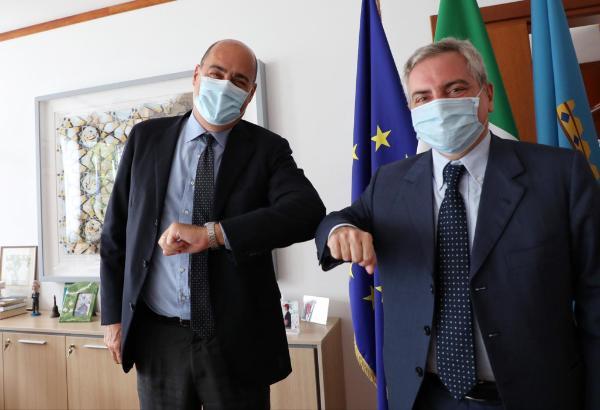
- Multisectoral framework agreement worth €300m in loans with maturities of up to 25 years for projects planned under the Multiannual Regional Programme
- Loans totalling €200m will also be made available to around 400 SMEs and mid-caps in partnership with UniCredit, BCC Roma and Banca Popolare di Sondrio
- The EIB will provide advisory services and technical assistance to Councillors to develop projects, particularly in the fields of energy efficiency of public buildings and sustainable mobility
This wide-ranging collaboration between the bank of the European Union and the Lazio Region will lead to funding of €500m in all production sectors in the coming years. This is the goal of the agreements already signed or still being finalised that were announced today by Dario Scannapieco, Vice-President of the European Investment Bank (EIB), and Nicola Zingaretti, President of the Lazio Region, and which are also intended to support the post COVID-19 recovery.
Multisectoral framework agreement: €300m
The first operation concerns the Framework Agreement for €300m worth of loans to the Region over the next four years, which has already been signed. On the basis of the Agreement, projects aimed at combating climate change, preventing and mitigating risks from hydrogeological instability, improving, building and upgrading public urban and regional infrastructure, and protecting the environment will be eligible under the Regional Multiannual Programme. Emergency measures to tackle the COVID-19 pandemic could also be financed in order to contribute significantly to the economic recovery.
The loans can have maturities of up to 25 years, with a five-year grace period. In addition to financing operations, this cooperation will also enable the Region to benefit from the EIB’s free advisory services and technical assistance. This advisory support is already being provided in the preliminary phase of projects for energy efficiency of public buildings and sustainable mobility.
SMEs and mid-caps: €200m in partnership with banks
A second operation, which is currently being finalised, is based on initial EIB financing to the Region for projects launched by SMEs (up to 250 employees) and mid-caps (250-3 000 employees) in all production sectors, again with a special focus on investment to tackle the consequences of the COVID-19 pandemic. The credit line will be onlent to companies in the Lazio region active in all economic sectors via three intermediary banks selected by the Region following a public tender: UniCredit, BCC Roma and Banca Popolare di Sondrio. The three banks will double the EIB’s €100m to a total of €200m, which will benefit an indicative number of 400 businesses based in the Region. Loan maturities will be 12 years for private firms and 15 years for investments carried out by public-private companies, with a three-year grace period.
EIB Vice-President Dario Scannapieco said: “Thanks to its collaboration with the Region, the EU bank will be able to truly support citizens and businesses in Lazio at this difficult time in order to mitigate the effects of the pandemic and support the recovery. Regional projects for urban and regional public infrastructure and to protect against hydrogeological instability and environmental damage will be financed, confirming the EIB’s role as a climate bank. And thanks to its partnership with the banks present in the region, hundreds of SMEs and mid-caps will also be supported.”
President of the Lazio Region Nicola Zingaretti said: “The post COVID-19 recovery that we are envisioning together with the production sector in our region will come about thanks to important agreements such as this one with the European Investment Bank. The granting of €300m worth of loans on extremely favourable financial terms enables us to provide liquidity and therefore instil confidence and hope in the strategic sectors of our regional economy – to help protect the environment, improve how public services are provided, develop infrastructure and make specific investments in health and civil protection. Phase 3 of Lazio’s response to COVID-19 sees the Region bounce back and begin a new investment cycle.”